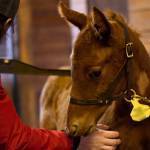Study Links Foal Growth, Radiograph Data to Sales and Racing Performance

Building on three decades of research on growth and skeletal disease in Thoroughbreds, Kentucky Equine Research recently completed a pilot study to determine the relationship between growth, radiographic data, and performance, both in the sales ring and on the racetrack.
One goal of the study is to identify foals at risk of developmental problems early so management strategies can be set into motion as soon as possible.
The study tracked 318 foals from six different commercial breeding farms in Kentucky between 2013 and 2017. Growth data was collected monthly by representatives of Hallway Feeds, a Kentucky Equine Research feed manufacturing partner. This data was then mapped using Gro-Trac® software. In addition to analyzing growth stats, researchers evaluated radiographic data in the form of survey and sales radiographs. Of particular interest to the researchers was the incidence of osteochondritis dissecans (OCD) and sesamoiditis.
The study showed that extremes in body weight and height, either too big or too small, are not ideal for racetrack performance. Because greater body weight and height are rewarded at sales by higher sale prices, a balance between size and soundness must be reached for commercial success.
Month of birth proved a critical factor in how foals grow and may play an important role in the development of both OCD and sesamoiditis. Early-born foals are born small and grow faster once weaned, while later-born foals are born large, grow slowly after weaning, and may experience compensatory growth during sales prep.
Adjusting mare nutrition to compensate for poor pasture availability early and maintaining consistent growth with later-born foals after weaning may help reduce the incidence of skeletal disorders in growing Thoroughbreds.
A larger study to build on this pilot group is currently being conducted with more Thoroughbred farms in Kentucky as well as with breeders in other major breeding centers around the world, including Australia, New Zealand, Japan, England, and France.
Read more about the study on Thoroughbred Daily News. Commercial Thoroughbred farms interested in participating can contact pagan@ker.com.








